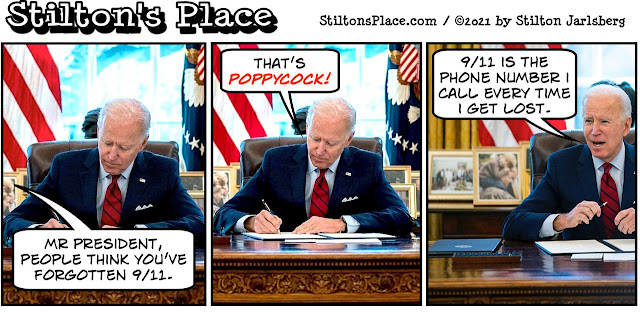We're still not in the proper headspace for editorializing or, according to the warning labels, operating heavy machinery. But the unfolding disaster in Afghanistan demands commentary. Fortunately, William McGurn wrote a great piece for the Wall Street Journal that we're sharing here in its entirety.
============
A TALIBAN 9/11 - Joe Biden rushed the Afghanistan pullout for a political speech he wanted to give
William McGurn, Wall Street Journal, 8/23/21
What on earth will Joe Biden say this Sept. 11?
We know what he planned to say. He hoped to use the 20th anniversary to proclaim himself the president who had succeeded in doing what none of his predecessors— George W. Bush, Barack Obama and Donald Trump —could: end the “endless war” in Afghanistan. The purpose of the artificial deadline was to provide Mr. Biden a dramatic backdrop for the speech he wanted to give.
The bungled exit has scuttled that plan. Worse, it has forever surrendered 9/11 to the Islamist fundamentalists. It is now what they meant it to be in 2001: their day of victory.
Part of this victory belongs to al Qaeda, which seared the date 9/11 into America’s memory. Today al Qaeda’s leaders have regained the haven that they used to plan and carry out the 9/11 attacks, under the same Taliban hosts who refused to give them up even after President Bush declared the U.S. wouldn’t distinguish between the terrorists who attacked us and those who harbored them.
The Taliban victory is bigger still. Over the weekend, propaganda attributed to the Taliban’s Badri 313 unit featured a photo of its fighters, clad in captured American gear, raising the Taliban flag in a parody of the iconic World War II image of Marines raising the Stars and Stripes on Iwo Jima’s Mount Suribachi. They intend to rub it in.
And why not? They won.
Back on the home front, some are arguing that it is only the botched execution, not the decision to retreat itself, that is at issue. Some further accuse President Biden of eliding responsibility by deliberately conflating the two, which he did again Sunday by emphasizing how “absolutely correct” he was in making the call to bug out.
But there is a cheaper argument about what went wrong, embedded in throwaway lines like “20 years of failure.” U.S. mistakes in Afghanistan were real, numerous, and often costly. But to write off the entire enterprise as a failure because Afghanistan didn’t transform itself into Belgium in 20 years is not serious.
Yes, there was too much optimism about remaking Afghanistan as a liberal democracy. But a more modest measure of success might yet acknowledge there is something to be said for staving off the worst—a Taliban victory. Just as we have managed in Korea, where we have 28,500 U.S. troops and there is still officially a “forever war” going on between North and South.
For as corrupt and incapable as the Afghan government was, it was a significant improvement over its predecessor—and now its successor. Not to mention Afghan women and girls whose lives are about to return to pre-medieval times. Whatever the waste and foolishness on America’s part, it’s doubtful those desperate Afghans climbing the walls at Kabul airport would be as quick to dismiss it all as 20 years of failure.
Not to mention the hit to U.S. credibility. Our most important military alliance—NATO—stands broken and discredited by the man who campaigned as the seasoned expert in diplomatic affairs. Armin Laschet, who is favored to become the new German chancellor, called the pullout a “debacle.” In the U.K., a House of Commons debate featured adjectives like “shameful” and “cruel and humiliating.” This from our friends.
On Sunday the president absurdly claimed that Moscow and Beijing read our graceless exit from Afghanistan as somehow enhancing U.S. capabilities and resolve elsewhere. To the contrary, Xi Jinping is quickly moving to replace U.S. influence in Afghanistan with China’s. And Vladimir Putin is acknowledging what he thinks of Mr. Biden’s resolve by telling the U.S. not even to think of relocating some of our forces in neighboring countries that he considers part of Russia’s sphere of influence.
So a question for those who still believe Mr. Biden was right to pull us out: Do they also believe his assurances that our loss of on-the-ground intelligence, an air base in a strategic part of the world, and an ally instead of an enemy in Kabul will all be compensated for with “over the horizon” capabilities?
No doubt most Americans have always wanted our men and women in uniform to come home. But the American people aren’t children.
It’s a pity that so few of our political leaders have been willing to make the hard argument that a continued presence in a highly strategic area might pay the kind of dividends our continued presence in, say, Germany, Japan and South Korea have. Especially given that U.S. combat responsibilities in Afghanistan had largely ended and the residual force would have been a fraction of the more than 100,000 troops we had there a decade ago (the Afghanistan Study Group suggested 4,500).
In three weeks we will mark the 20th anniversary of the deadliest attack on America’s home soil. Those who gave shelter to the terrorists who pulled it off will be whooping it up in Kabul. What on earth can Joe Biden’s speechwriters come up with now that won’t make it worse?





